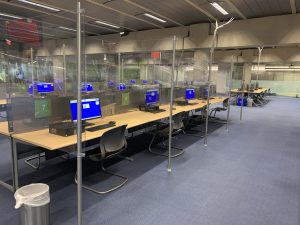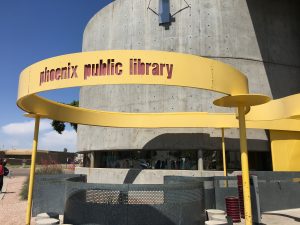- Slug: BC-CNS Radical Librarian, 1,120 words.
- 2 handout photos and captions below.
- 1 video here.
By Brianna Alexander
Cronkite News
After more than a year of services limited to curbside pickup and drop-off services, the Phoenix Public Library has reopened some in-building services, including computer use, access to Wi-Fi hotspots and checking out materials.
The City Council this month unanimously approved a plan that will return in-building visits to 16 library branches. Other libraries in Arizona, including Maricopa County Libraries and the Glendale and Scottsdale city libraries, also restored some indoor services as pandemic restrictions eased.
Phoenix library representatives have said they’re happy to welcome back patrons and have worked with health officials to establish safety protocols for employees and visitors.
But Fobazi Ettarh, 31, who calls herself a radical librarian working in “librarianship, education, activism, and all the intersections in between,” says restoring in-person services in libraries ignores longstanding inequities that need long-term solutions. If libraries return to operating as before the pandemic, she says, it would mean Americans are content to continue to rely on libraries to fill gaps in social services.
Ettarh, based in Newark, New Jersey, writes “WTF Is a Radical Librarian Anyway?” which discusses libraries’ critical value in communities but also pushes against libraries’ reputation as equitable, egalitarian spaces where librarians should be revered. In a 2018 essay, she pointed to the history of libraries’ exclusion of African Americans in the South during Jim Crow and the lack of diversity among librarians; “librarianship is over 80% white and female” with “lots of marginalization,” she said.
Today, “many libraries open their spaces to the disadvantaged and displaced populations in the community, such as the homeless or the mentally ill,” Ettarh wrote. Libraries often offer services, such as computers, copying services and Wi-Fi, to patrons who can’t afford them on their own.
In an interview with Cronkite News, the activist explained why she believes opening libraries at this time actually hurts those who are less fortunate, highlights inequality and risks the safety of library workers.
Where does the term ‘radical librarian’ come from?
I don’t recall exactly who called me a radical librarian, but I’ve sort of taken the moniker on for myself. I think it comes from the fact that librarianship in a lot of ways is still very entrenched in its idea of itself, and so a lot of things continue to happen just because it’s the way it’s always happened. There’s not much thought about if this is something that needs to be done, and if so, does it need to be done in this way and so on, so forth. I try to think about what it is we’re doing and why. Many of us who end up in the field find that the field itself can be very exclusionary.
What are your thoughts on libraries restoring in-building visits?
I believe that it’s too soon to be opening up any buildings, but especially library buildings. We’re known as one of the last noncommercial spaces right that you can go in without having to necessarily buy anything, and so, because the library plays such a huge, beloved role in the community, it really sets the tone for what is considered acceptable or not acceptable.
We’ve seen reporters who have talked to community members in these articles discussing whether or not the library should stay open or closed, saying that if the library is open, (the coronavirus) can’t be that bad of a crisis. You know the lie – if it was truly that bad, the library would be closed, and so, if we know now that people look at institutions of libraries as sort of a barometer of crisis level, then I don’t think that we are at a safe enough point to be giving that message to our communities yet.
Library workers shouldn’t have to take on the role of all of those underfunded social services in order to keep society running. We shouldn’t have to be the sacrificial lambs, as it were, to make sure that everyone else can continue to live their lives, because we are people, too. Until we can guarantee that all the library workers will be safe, it’s a huge detriment to them to put their own health on the line in service of some greater good.
What about the impact in-building visits have on people who aren’t vaccinated? Do you believe it’s more beneficial or harmful for those who are less fortunate and need the library?
The argument for opening often tends to be equity based. The library needs to be open in order to have people without access to devices such as computers and the internet be able to gain those services.
My rebuttal to that is always that we’re not actually creating equity by opening the library. All we’re doing is actually reinforcing the divide that is already there, so those who are privileged enough to have their own devices at home, to have their own broadband at home, can continue to be successful in their work and studies, whatever it might be, without having to encounter other people.
Those who do not have that access have to now weigh the potential for getting a deadly virus against, “I’m preparing for class,” or filling out a job application online. It is just showing how inequitable the system is to have to go to a congregation point in order to continue to be successful in society.
The virus doesn’t care about this productivity culture.
While in the short term it might seem more equitable, in the long term, what it’s doing is continuing to decimate these communities of color and other marginalization ones that are already too marginalized for us to even really imagine.
Do you believe that keeping library doors closed would provide a long-term solution to equity?
I think that as we’ve seen, the fact that Verizon and some of the other broadband companies actually did open their services up for children who needed to go to school and use online platforms to do so. It goes to show that those companies were always able to provide access to these resources to those without money, without the opportunity to have them. It took basically everything else shutting down and them being forced to comply in order for them to actually do it.
What can the public do to help?
If we just sort of rush back to the way things were prior to the pandemic, all it’s going to show is that there is no need for long-term advocacy for these communities. Whereas if we continue to put the pressure on these companies, there might be ways to sustain some of these programs after things start to get back to normal, as it were.
For more stories from Cronkite News, visit cronkitenews.azpbs.org.
^__=

